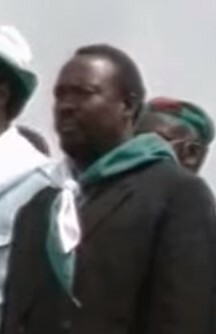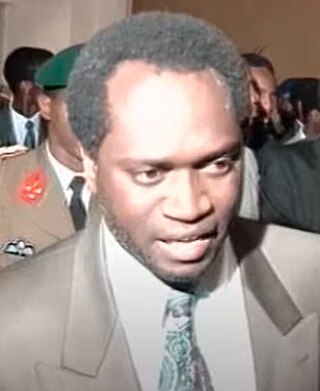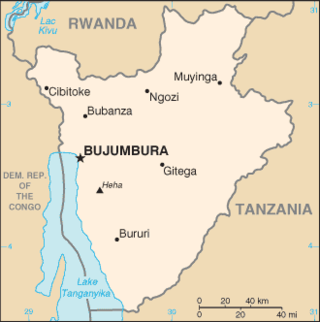Related Research Articles

Burundi originated in the 16th century as a small kingdom in the African Great Lakes region. After European contact,it was united with the Kingdom of Rwanda,becoming the colony of Ruanda-Urundi - first colonised by Germany and then by Belgium. The colony gained independence in 1962,and split once again into Rwanda and Burundi. It is one of the few countries in Africa to be a direct territorial continuation of a pre-colonial era African state.

Cyprien Ntaryamira was a Burundian politician who served as President of Burundi from 5 February 1994 until his death two months later. A Hutu born in Burundi,Ntaryamira studied there before fleeing to Rwanda to avoid ethnic violence and complete his education. Active in a Burundian student movement,he cofounded the socialist Burundi Workers' Party and earned an agricultural degree. In 1983,he returned to Burundi and worked agricultural jobs,though he was briefly detained as a political prisoner. In 1986 he cofounded the Front for Democracy in Burundi (FRODEBU),and in 1993 FRODEBU won Burundi's general elections. He subsequently became the Minister of Agriculture and Animal Husbandry on 10 July,but in October Tutsi soldiers killed the president and other top officials in an attempted coup.

Pierre Buyoya was a Burundian army officer and politician who served two terms as President of Burundi in 1987 to 1993 and 1996 to 2003. He was the second-longest-serving president in Burundian history.

Sylvestre Ntibantunganya is a Burundian politician. He was President of the National Assembly of Burundi from 23 December 1993 to 30 September 1994,and President of Burundi from 6 April 1994 to 25 July 1996.

Melchior Ndadaye was a Burundian banker and politician who became the first democratically elected and first Hutu president of Burundi after winning the landmark 1993 election. Though he attempted to smooth the country's bitter ethnic divide,his reforms antagonised soldiers in the Tutsi-dominated army,and he was assassinated amidst a failed military coup in October 1993,after only three months in office. His assassination sparked an array of brutal tit-for-tat massacres between the Tutsi and Hutu ethnic groups,and ultimately led to the decade-long Burundi Civil War.

The Burundian Civil War was a civil war in Burundi lasting from 1993 to 2005. The civil war was the result of longstanding ethnic divisions between the Hutu and the Tutsi ethnic groups. The conflict began following the first multi-party elections in the country since its independence from Belgium in 1962,and is seen as formally ending with the swearing-in of President Pierre Nkurunziza in August 2005. Children were widely used by both sides in the war. The estimated death toll stands at 300,000.

Sylvie Kinigi is a Burundian politician and economist who served as prime minister of Burundi from 10 July 1993 to 7 February 1994,and acting president from November 1993 to 5 February 1994,making her the second African woman to serve as a president.

The Senate is the upper chamber of Parliament in Burundi. It consists of between 39 and 56 members who serve 5-year terms. The current Senate was elected on 20 July 2020 and consists of 39 members. Under the newly promulgated 2018 constitution and following the new administrative division,the senate similarly to the national assembly saw its number of seats reduced. The senate goes from 39 seats to 13 seats starting from the 2025 legislative elections.

The position of vice-president of the Republic of Burundi was created in June 1998,when a transitional constitution went into effect. It replaced the post of Prime Minister.

The National Liberation Front is an ethnically Hutu political party in Burundi that was formerly active as militant rebel group before and during the Burundian Civil War.

Mass killings of Tutsis were conducted by the majority-Hutu populace in Burundi from 21 October to December 1993,under an eruption of ethnic animosity and riots following the assassination of Burundian President Melchior Ndadaye in an attempted coup d'état. The massacres took place in all provinces apart from Makamba and Bururi,and were primarily undertaken by Hutu peasants. At many points throughout,Tutsis took vengeance and initiated massacres in response.

Burundi,officially the Republic of Burundi,is a landlocked country in the Great Rift Valley at the junction between the African Great Lakes region and Southeast Africa,with population of over 14 million people. It is bordered by Rwanda to the north,Tanzania to the east and southeast,and the Democratic Republic of the Congo to the west;Lake Tanganyika lies along its southwestern border. The capital city is Gitega and the largest city is Bujumbura.

Ethnic groups in Burundi include the three main indigenous groups of Hutu,Tutsi and Twa that have largely been emphasized in the study of the country's history due to their role in shaping it through conflict and consolidation. Burundi's ethnic make-up is similar to that of neighboring Rwanda. Additionally,recent immigration has also contributed to Burundi's ethnic diversity. Throughout the country's history,the relation between the ethnic groups has varied,largely depending on internal political,economic and social factors and also external factors such as colonialism. The pre-colonial era,despite having divisions between the three groups,saw greater ethnic cohesion and fluidity dependent on socioeconomic factors. During the colonial period under German and then Belgian rule,ethnic groups in Burundi experienced greater stratifications and solidification through biological arguments separating the groups and indirect colonial rule that increased group tensions. The post-independence Burundi has experienced recurring inter-ethnic violence especially in the political arena that has,in turn,spilled over to society at large leading to many casualties throughout the decades. The Arusha Agreement served to end the decades-long ethnic tensions,and the Burundian government has stated commitment to creating ethnic cohesion in the country since,yet recent waves of violence and controversies under the Pierre Nkurunziza leadership have worried some experts of potential resurfacing of ethnic violence. Given the changing nature of ethnicity and ethnic relations in the country,many scholars have approached the topic theoretically to come up with primordial,constructivist and mixed arguments or explanations on ethnicity in Burundi.

The 1996 Burundian coup d'état was a military coup d'état that took place in Burundi on 25 July 1996. In the midst of the Burundi Civil War,former president Pierre Buyoya deposed Hutu President Sylvestre Ntibantunganya. According to Amnesty International,in the weeks following the coup,more than 6,000 people were killed in the country. This was Buyoya's second successful coup,having overthrown Jean-Baptiste Bagaza in 1987.
Cyriaque Simbizi was a Burundian Minister of Communication who was assassinated in a plane shootdown.

On 21 October 1993,a coup was attempted in Burundi by a Tutsi–dominated army faction. The coup attempt resulted in assassination of Hutu President Melchior Ndadaye and the deaths of other officials in the constitutional line of presidential succession. François Ngeze was presented as the new President of Burundi by the army,but the coup failed under domestic and international pressure,leaving Prime Minister Sylvie Kinigi in charge of the government.
Victoire Ndikumana is a Burundian politician for the UPRONA party. She was Minister of Women's Advancement and Social Protection from 1991 to 1993,and Minister of Trade,Industry,Posts and Tourism from 2010 to 2014.
The 2010 Senate of Burundi sat from 2010 to 2015.
The Banque de commerce et de développement,or BCD,was a short-lived state-owned bank in Burundi.
References
- 1 2 3 Seymour 1996.
- 1 2 Frilet 1995.
- 1 2 1995 CIA World Factbook.
- 1 2 Burundi, dirigeants politiques.
- 1 2 Report of the Special Rapporteur.
- ↑ Reyntjens & Vandeginste 1997, p. 3.
- 1 2 3 Lunn 2006, p. 28.
- ↑ Reyntjens & Vandeginste 1997, p. 2.
- ↑ Burundi Constitutional Background.
- ↑ Regional Leaders To Impose Sanctions.
- ↑ Un apartheid qui ne dit pas son nom.
- ↑ Nkurunziza, Ndikumana & Nyamoya 2010, p. 38.
- 1 2 Nkurunziza, Ndikumana & Nyamoya 2010, p. 39.
- ↑ Burundi: Delegation Leaves for Pretoria.
- ↑ Nkurunziza, Ndikumana & Nyamoya 2010, p. 40.
- ↑ Young Burundians visit Kigali Memorial.
- ↑ Pierre Buyoya jette l'éponge.